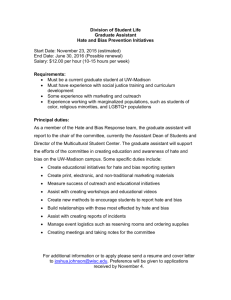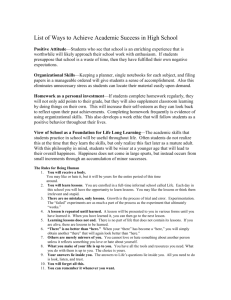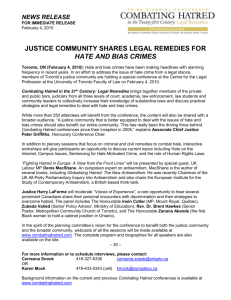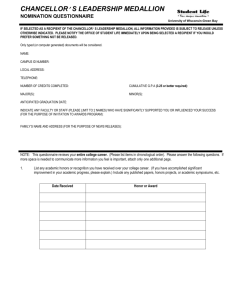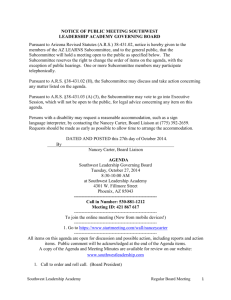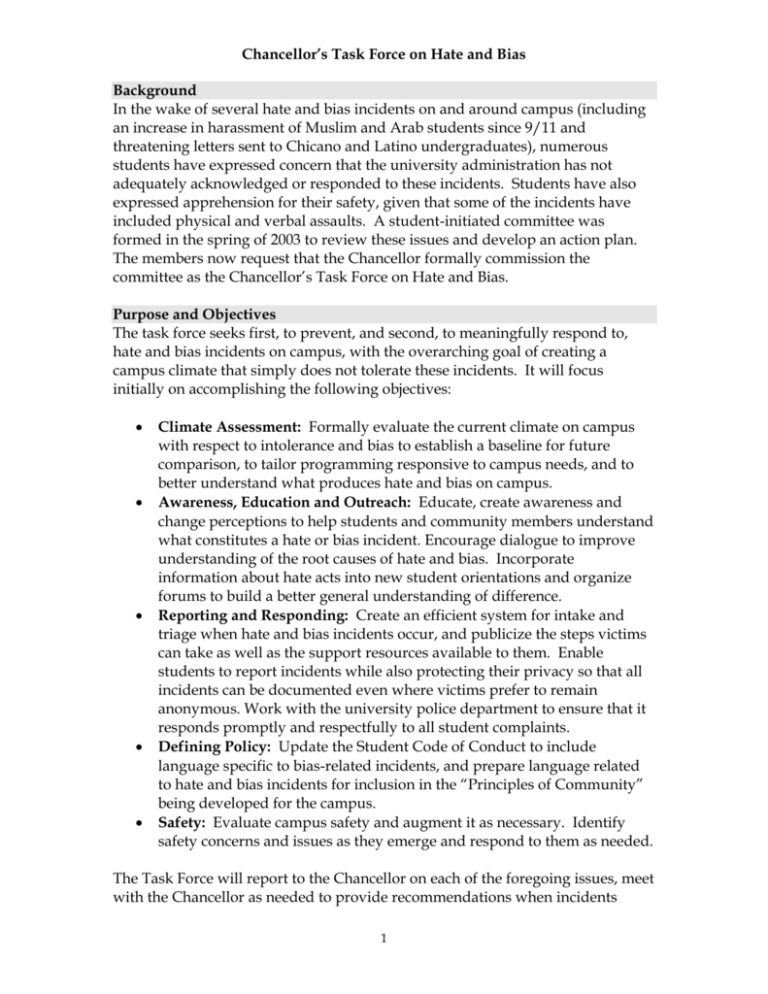
Chancellor’s Task Force on Hate and Bias
Background
In the wake of several hate and bias incidents on and around campus (including
an increase in harassment of Muslim and Arab students since 9/11 and
threatening letters sent to Chicano and Latino undergraduates), numerous
students have expressed concern that the university administration has not
adequately acknowledged or responded to these incidents. Students have also
expressed apprehension for their safety, given that some of the incidents have
included physical and verbal assaults. A student-initiated committee was
formed in the spring of 2003 to review these issues and develop an action plan.
The members now request that the Chancellor formally commission the
committee as the Chancellor’s Task Force on Hate and Bias.
Purpose and Objectives
The task force seeks first, to prevent, and second, to meaningfully respond to,
hate and bias incidents on campus, with the overarching goal of creating a
campus climate that simply does not tolerate these incidents. It will focus
initially on accomplishing the following objectives:
Climate Assessment: Formally evaluate the current climate on campus
with respect to intolerance and bias to establish a baseline for future
comparison, to tailor programming responsive to campus needs, and to
better understand what produces hate and bias on campus.
Awareness, Education and Outreach: Educate, create awareness and
change perceptions to help students and community members understand
what constitutes a hate or bias incident. Encourage dialogue to improve
understanding of the root causes of hate and bias. Incorporate
information about hate acts into new student orientations and organize
forums to build a better general understanding of difference.
Reporting and Responding: Create an efficient system for intake and
triage when hate and bias incidents occur, and publicize the steps victims
can take as well as the support resources available to them. Enable
students to report incidents while also protecting their privacy so that all
incidents can be documented even where victims prefer to remain
anonymous. Work with the university police department to ensure that it
responds promptly and respectfully to all student complaints.
Defining Policy: Update the Student Code of Conduct to include
language specific to bias-related incidents, and prepare language related
to hate and bias incidents for inclusion in the “Principles of Community”
being developed for the campus.
Safety: Evaluate campus safety and augment it as necessary. Identify
safety concerns and issues as they emerge and respond to them as needed.
The Task Force will report to the Chancellor on each of the foregoing issues, meet
with the Chancellor as needed to provide recommendations when incidents
1
Chancellor’s Task Force on Hate and Bias
occur, and prepare an annual report. The co-chairs will meet with the Chancellor
once per semester.
Structure
The co-chairs of the task force will be Dean of Students Karen Kenney and
student Adil Khan. The task force will have 30 members, including 16 students
and 14 administrators, staff, faculty, and community members. The group will
meet twice per semester, with the following four subcommittees reporting in to
the entire task force:
Education and Outreach: Co-chaired by two student leaders, this
subcommittee will develop outreach and educational policy as well as
literature and educational resources, including newsletters and other
publicity materials. It will provide cross-cultural programming, educate
students about hate acts, coordinate sensitivity trainings for students and
staff, and publicize the task force’s existence and objectives.
Policy: Co-chaired by two student leaders, this subcommittee will
articulate the task force’s priorities, develop language for the Student
Code of Conduct & Principles of Community and establish an oversight
board to review how incidents are handled.
Reporting and Responding: Co-chaired by one student and one nonstudent, this subcommittee will devise a mechanism for reporting and
responding to hate and bias incidents, establish links between the
university and city police, and create an incident response team.
Safety and Security: Co-chaired by one student and one non-student, this
subcommittee will address the communication protocols between
university and city police, review the efficiency of public transportation as
it relates to safety and access routes, help supplement officer sensitivity
training, evaluate the adequacy of lighting and emergency phones on
campus, and develop an annual security report.
Attachment 1: Detail of Task Force Structure and Membership
2
Chancellor’s Task Force on Hate and Bias
Attachment 2: Detail of Task Force Subcommittee Responsibilities and Membership
3
Chancellor’s Task Force on Hate and Bias
ATTACHMENT 1
Detail of Task Force Structure
Proposed Structure for the Chancellor’s Task Force on Hate & Bias:
Total Committee Membership: 29 with 4 ex-officio
16 students and 13 administrators, staff and faculty
Administrators (1):
Dean of Students Co-Chair
Ex-Officio: Vice Chancellors by invitation
Students (16):
Student Co-Chair (1)
Student-Chairs of the 4 Subcommittees (5)
1 at-large reps/committee (4)
1 rep/organized living community (Greeks, Co-Ops, ResHalls/RHA, I-House) - 4
1 GA Rep
1 ASUC Rep
Staff (7):
Chief of UCPD or his/her designate (1)
Allan Creighton, UHS Violence Prevention Coordinator (1)
Nancy Chu, Title IX Officer (1)
Representative, Gender Equity Resource Center (1)
Representative, Multicultural Student Development Center (1)
Representative, Disabled Students’ Program (1)
Director, Student Judicial Affairs or his/her designate (1)
Faculty (5):
Chair, Committee on the Status of Women and Ethnic Minorities (SWEM - Academic Senate)
Chair, Committee on Student Affairs (STA – Academic Senate)
Rep, Boalt Social Justice Program
Reps from relevant departments (e.g. ethnic studies, sociology, women’s studies, PACS,
Law/Legal Studies) – up to 2
Community (4) – Ex-Officio:
David Stark, Stiles Hall
Ana Traylor, YWCA Racial Justice Program
Rep, University Religious Council
Berkeley PD Rep
Support:
The Task Force will designate funds in order to invite speakers with expertise in these areas to
provide consultations, training, etc. The Task Force will be staffed by 1 student intern and 1 full
time staff member.
SUBCOMMITTEES:
Student Representation on Subcommittees shall be as follows:
4
Chancellor’s Task Force on Hate and Bias
Education & Outreach:
Will be Co-Chaired by two student leaders – one responsible for educational development, one for
outreach. Chairs will be appointed in the first year of existence and will be elected by a majority of
the student membership of that subcommittee in all following years. The representatives from the
Co-Ops, Greek Community and RHA will sit on this subcommittee.
Policy:
Will have two co-chairs – one student and one staff/faculty/administrator. Chairs will be appointed
in the first year of existence and will be elected by a majority of the student membership of that
subcommittee in all following years. The student representatives to the Police Review Board as
well as the reps from the Committee to Review the Student Code of Conduct and the Committee
on Campus Community will sit on this committee.
Reporting:
Will have two co-chairs – one student and one staff/faculty/administrator. Chairs will be appointed
in the first year of existence and will be elected by a majority of the student membership of that
subcommittee in all following years.
Safety:
Will have a student co-chair and a staff/faculty/administrative co-chair. Student chairs will be
appointed in the first year of the task force’s commission and will be elected by a majority of the
student membership of that subcommittee in all following years.
Defining Committee/Subcommittee Student Membership:
All student representatives to the general task force will sit on a subcommittee of the task force. All
other at-large student representatives to the task force will be selected jointly by the student chairs
of those subcommittees by application. These recommendations will then be reviewed by the cochairs (administrative and student) of each subcommittee and will be forwarded to the Task Force.
The membership of these at-large student reps must adequately reflect the campus community,
including representation from (but not limited to) the following at-risk communities: queer, Sikh,
Muslim, Arab, Jewish, African-American, Asian & Pacific Islander American, La Raza, Native
American, women’s, disabled. The student representatives must attend 75% of all
meetings/events; failure to attend meetings will result in notification and expulsion from the task
force. The committee is encouraged to incorporate proactive students from established student
groups, although OSL student group membership is not required to serve on these subcommittees.
The responsibility of disseminating information to the student population in order to recruit student
members falls upon the Education & Outreach Committee, who will be designated an appropriate
budget and the necessary adequate resources (e.g. @uclink listserv, fliers, access to CalSO, OSL,
DSP, and other relevant offices) to accommodate this need. Students are expected to spend up to
5 hours/week, which includes participation in (sub)committee meetings, task force events, and
biweekly student-only caucuses. Student chairs are also required to meet with the campus
community at large at least twice per semester. Subcommittee membership is open to all students,
while voting rights are reserved for those who attend 75% of all subcommittee meetings/events.
5
Chancellor’s Task Force on Hate and Bias
ATTACHMENT 2
Detail of Task Force Subcommittee Responsibilities and Membership
Subcommittee on Safety:
Predominantly addresses UCPD and BPD and their communication and
protocol/resources
Efficiency of public transportation with respect to safety and access routes (ride shares,
carpool discounts, better bus access/times)
CSO training, Officer Sensitivity Training
Blue lights, emergency phones, safety walks, UCPD marketing/communications, patrol
(efficient)
Annual security report (can be integrated into Safety Counts) as per the Cleary Act – see
the FBI’s version for a good reference
Co-Chairs: Student & UCPD Chief of Police (or his/her designate)
Membership: 3-5 students + faculty/staff as appropriate
Subcommittee on Policies & Reporting
maintaining/updating the web site
developing reporting strategies/mechanisms/links between the BPD, UCPD, etc.
HateWatch
policy re: response/reporting mechanism, response team
education/outreach plan
oversight board (like PRB maybe?)
addressing the Student Code of Conduct & Principles of Community
overseeing communication between the community at large and the task force (review
incidents and update communities about what’s going on)
Co-Chairs: Administrator + Student
Vice-Chairs: Administrator + Student
Membership: 3-4 students + 3-4 faculty
the Co-Chairs should be split (one that specializes in policy, one in reporting) and then
their vice-chairs should be of an alternate affiliation (i.e. if an admin is the policy co-chair,
then a student must be the vice-chair)
students feel policy & reporting should be split into 2 committees
ask Anu about how she’s working on policy, etc, and how to integrate it
Subcommittee on Education & Outreach
design literature and educational resources
coordinate newsletters/outreach
networking and cross-cultural programming
making resources available for all students
coordinating activities/programming
6
Chancellor’s Task Force on Hate and Bias
work with the policy to design an outreach/educational policy
coordinating sensitivity trainings for all students/student-staff
sending communications/letters letting the campus know the Hate Acts existence,
purpose, etc. to the campus community at large
Co-Chairs: Students-only
Membership: 50% students
7


